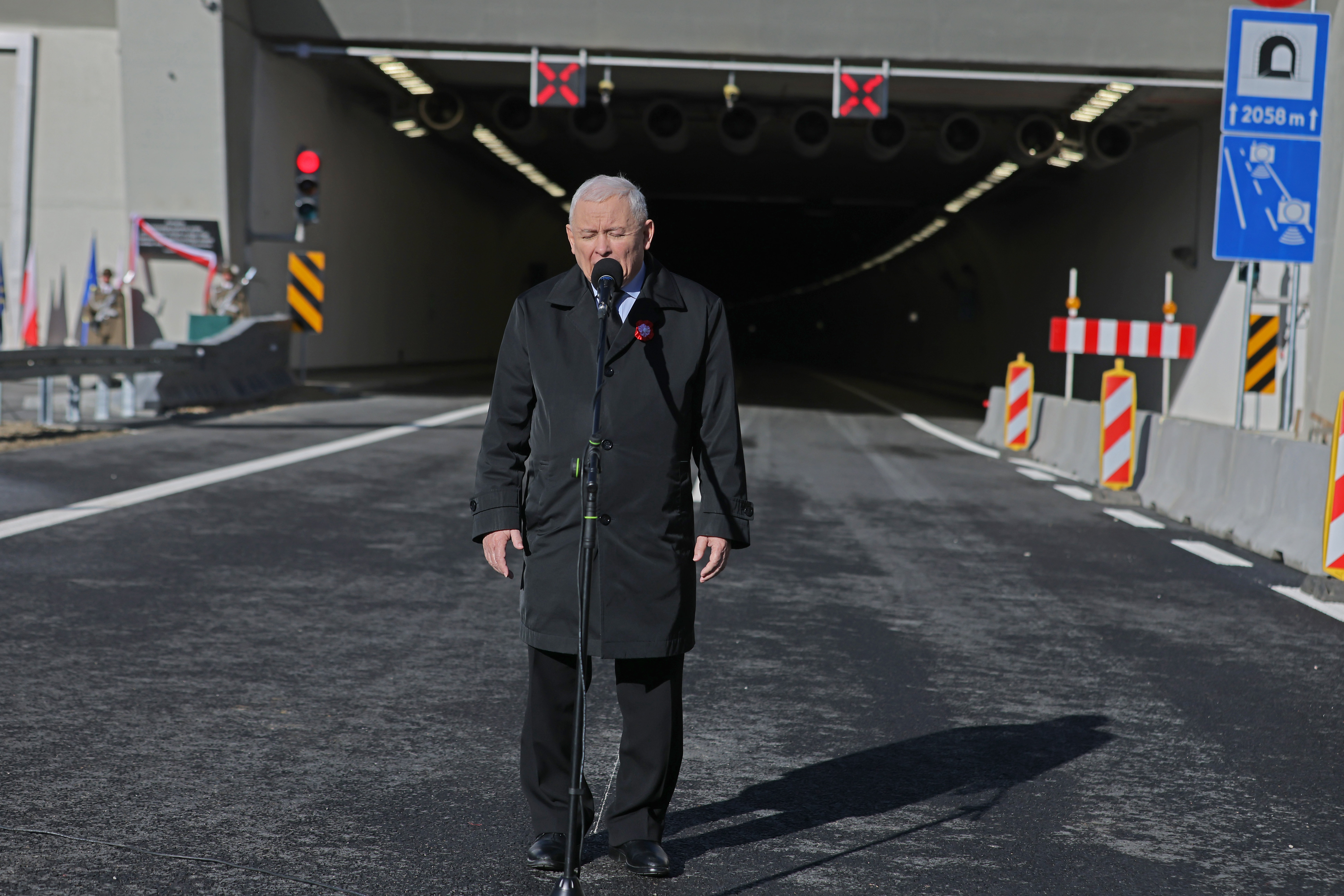A European Commission representative has revealed that he was prevented from speaking at the opening of a tunnel, most of which was paid for by the EU. The government had previously agreed he could speak at the ceremony, but in the end the project’s EU funding was not mentioned at all.
The 2,058-metre-long road tunnel – which cuts through part of Luboń Wielki mountain in southern Poland and will connect Kraków to the town of Zakopane – was opened at a ceremony on Saturday.
Among those attending were Jarosław Kaczyński, the head of Poland’s ruling party; infrastructure minister Andrzej Adamczyk; and the archbishop of Kraków, Marek Jędraszewski, who performed a blessing. The tunnel has been named after Lech Kaczyński – the late president and twin brother of Jarosław – and his wife Maria.
Prezes #PiS J. #Kaczyński w #Naprawa: Śp. Maria Kaczyńska była podporą dla mojego Brata – nie mieli oni łatwego życia. Śp. Prezydent Lech Kaczyński odrzucił postkomunizm i m. in.dzięki jego pracy my mogliśmy dokonać zmiany, która nastąpiła po 2015r. pic.twitter.com/G9Ktqvbwnk
— Prawo i Sprawiedliwość (@pisorgpl) November 12, 2022
The tunnel is “a very important investment…by the current government” not just for the local region but for “the whole country”, said Kaczyński at the ceremony. “Travel time and comfort will be improved,” added Tomasz Pałasiński, the local head of Poland’s road authority, the GDDKiA, quoted by Polsat.
However, while Adamczyk declared that the project would not have been possible “had it not been for the government’s decisions to increase financing for investments”, no mention was made at the ceremony of the fact that more than half the funding came from the EU, reports financial news service Money.pl.
The European Commission notes that the EU provided €303.6 million towards building the section of the road that includes the tunnel, more than half of the total costs of €567.5 million. This is also confirmed by the infrastructure ministry on its website.
Dziś zostanie otwarty tunel w ciągu Zakopianki, pod górą #LubońMały.
Odcinek drogi S7 powstał dzięki dofinansowaniu z #FunduszeUE 🇪🇺 w kwocie 303,6 mln euro. To ponad połowa kosztów inwestycji o wartości 567,5 mln euro.
Tunelowi zostanie nadane imię Lecha i Marii Kaczyńskich.
— Komisja Europejska (@EUinPL) November 12, 2022
After the Polish infrastructure ministry quoted Adamczyk saying that “vision and courage” are needed to “carry out big projects” like the tunnel, a European Commission representative in Poland, Jacek Wasik, tweeted that “apart from vision and courage, we also need EU funds, in this case 1.3 billion zloty”.
“I wanted to mention this at today’s opening, but, contrary to an earlier agreement with MI [the ministry], I was not allowed to speak,” continued Wasik. “Vive l’Europe!” he added.
Local news outlet Tygodnik Podhalański confirmed that journalists had been told before the ceremony that Wasik would speak, but “it turned out he was not allowed to”. An opposition MP, Kamila Gasiuk-Pihowicz, called the treatment of Wasik an “unprecedented scandal”.
Oprócz wizji i odwagi potrzebne są też #FunduszeUE, w tym przypadku 1,3 mld zł. I o tym chciałem przypomnieć na dzisiejszym otwarciu, ale wbrew wcześniejszym uzgodnieniom z @MI_GOV_PL nie dopuszczono mnie/@EU_Commission do głosu! Vive l’Europe 🇪🇺! https://t.co/YfLCIRrzZk
— Jacek Wasik 🇪🇺 🇺🇦 (@JacekWasikEU) November 12, 2022
Poland’s government has been locked in a long-running series of disputes with the EU over issues including the rule of law, refugee quotas and environmental policy.
Those conflicts have recently intensified due to the European Commission’s decision to freeze billions of euros in Poland’s post-pandemic recovery funds and cohesion funds over rule-of-law concerns.
Kaczyński and his party, however, deny that there is any threat to the rule of law, and accuse the commission of acting for political reasons as part of an effort – in collusion with the domestic opposition – to remove the Polish government.
Main image credit: Marek Podmokly / Agencja Wyborcza.pl

Daniel Tilles is editor-in-chief of Notes from Poland. He has written on Polish affairs for a wide range of publications, including Foreign Policy, POLITICO Europe, EUobserver and Dziennik Gazeta Prawna.




















